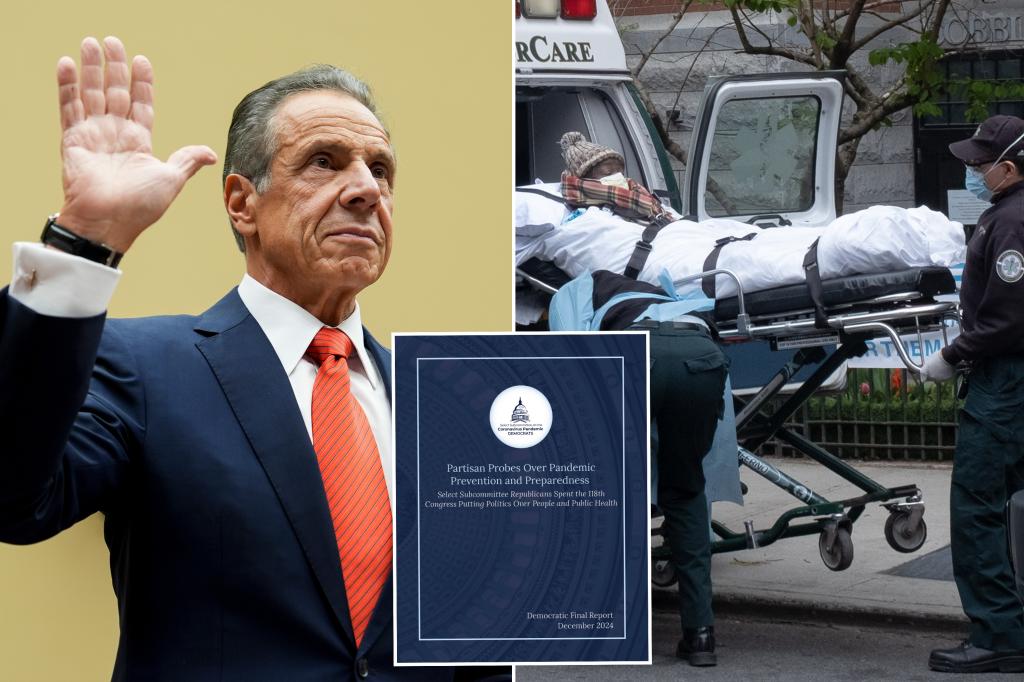On Tuesday, House Democrats released a scathing investigative report focused on the COVID-19 crisis, specifically criticizing former New York Governor Andrew Cuomo for his alleged interference with the reporting of nursing home deaths. The report contends that Cuomo’s administration intentionally downplayed the death toll among nursing home residents by omitting fatalities that occurred after patients were transported to hospitals. These findings come in stark contrast to earlier assessments and have emerged following a Republican-led investigation that described Cuomo’s actions as “medical malpractice”, particularly highlighting his directive from March 2020, which mandated that nursing homes admit patients infected with COVID-19. This controversial decision reportedly contributed to the deaths of over 15,000 seniors in these facilities, as it facilitated the spread of the virus among vulnerable populations.
Despite attempts by Cuomo and his representatives to dismiss the Republican report as politically motivated, the criticisms from his fellow Democrats in the House carry significant weight. The Democratic report indicated that Cuomo and his top aides misled the public regarding the actual number of COVID-19-related nursing home deaths, stating that any public official who sought to obscure the truth or mislead the public about the pandemic should face accountability. The report emphasized that Cuomo’s executive chamber obstructed the accurate reporting of data from the New York State Department of Health, particularly mentioning a widely criticized report issued in July 2020 that failed to account for “out-of-facility deaths,” which were deaths that occurred in hospitals after patients were transferred from nursing homes.
The report also addressed comments made by Melissa DeRosa, one of Cuomo’s senior advisors, who had expressed fear that the actual mortality figures could be weaponized against them by the Department of Justice during the Trump administration. This revelation feeds into a narrative of fear and obfuscation surrounding the Cuomo administration’s handling of nursing home data. At the same time, amidst this controversy, Cuomo was reportedly working on a $5 million book that highlighted his administration’s purportedly successful series of responses to the pandemic, further igniting accusations of hypocrisy and neglect of the realities experienced by nursing home residents during that time.
In contrast to the more tempered criticisms in the Democratic report, the Republican-led investigation labeled Cuomo as being “directly involved” in the decision to mandate the admission of COVID-infected patients into nursing homes and claimed this was a significant factor in a subsequent cover-up regarding nursing home fatalities. This report also indicated that Cuomo may have made false statements to the subcommittee, which could lead to serious legal repercussions, including potential prison time. Additionally, the GOP report suggested that Cuomo’s actions were consistent with an attempt to improperly influence testimony and obstruct the investigation, revealing a stark divide in the severity of accusations against the former governor based on party lines.
While the Democratic report refrained from placing blame on Cuomo for the nursing home mandate — a decision that was ultimately rescinded six weeks later — it still underscored a broader belief that the administration’s management of the pandemic was inadequate. Cuomo’s spokesperson defended the administration’s handling of nursing home data, insisting that the overall figures were accurate and attributing the initial withholding of out-of-facility death data to compliance with ongoing investigations. However, state Assemblyman Ron Kim, a vocal critic of Cuomo during the pandemic, expressed agreement with the GOP findings, calling for legal action against Cuomo for criminal fraud and perjury, citing the tragic consequences of his decisions that led to numerous unnecessary deaths among vulnerable populations.
This complex situation illustrates the significant political ramifications of Cuomo’s handling of the COVID-19 crisis. The release of both the Democratic and Republican reports signifies a pivotal moment in the ongoing discourse regarding accountability in governance and public health during a national emergency. With investigations into the actions and decisions made during the pandemic expected to continue and the potential for legal consequences looming over Cuomo, the landscape of New York’s political future remains uncertain. Cuomo’s possible aspirations for a political comeback, especially with hints of a bid for mayor of New York City, create an additional layer of intrigue as public opinion continues to grapple with the implications of his pandemic response and leadership style, reflecting a contentious split between Democratic factions on how to address the impacts of his administration during one of the nation’s darkest health crises.
As various investigations unveil differing narratives around the COVID-19 pandemic response, it remains vital for the public to critically assess the implications of these findings not only on individual political figures but also on the overall trust in governance during future health crises. The calls for accountability serve as a reminder of the lessons needed to navigate any similar crises more effectively in the future, ensuring that the vulnerability of marginalized populations like nursing home residents is not overlooked amid political maneuvering or the complexities of emergency management. The ongoing discourse surrounding Cuomo serves to reinforce a broader societal imperative: that transparency and integrity in leadership are foundational to maintaining public trust, especially in times of unprecedented strain on health systems and societal structures.

